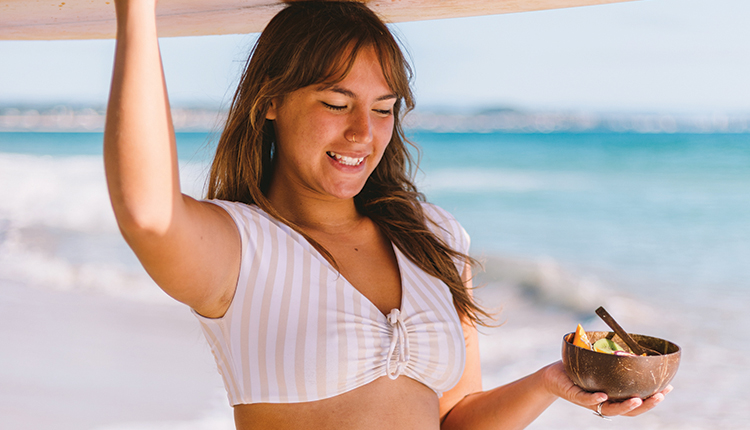
Maui Ocean Treasures, the gift shop inside Maui Ocean Center has taken many steps recently to be more sustainable in its product offerings.
The store carries eco-friendly toys, bamboo straws and utensils, beeswax wraps, jewelry made from recycled plastics, drinkware that promotes reuse and many more sustainable products. Sandy Fujiwara, retail manager, says it is part of a greater effort by Maui’s only aquarium to “go green for the blue.”
Customers are embracing the concept. “I think people just like having the ability to be part of the solution and not part of the problem by taking that one extra step to protect the natural environment for the future,” she says.
Other seaside retailers are also taking steps to be more eco-friendly. Caroline Ranoia, owner of Blue Eden LLC, decided to create a zero-waste product section in her connected Sea Foam Soap Co. and Blue Eden retail stores in Stone Harbor, New Jersey.
Since launching the section in 2020, the product options and space in the store have continued to grow. From what began as a small refill section, Ranoia now offers organic dental floss and refills, dish soap blocks, shampoo and conditioner bars, coca plant scrub pads, coca plant veggie cleaning brushes, detox soap and bar deodorant, vegan soap and charcoal toothbrushes with bamboo toothbrush holders.
It took a little while for the product section to gain traction, but now customers are stopping in regularly to refill their containers. They’re even bringing in their friends and explaining the section to them.
“They’re spreading the word and supporting a small business,” she says. “This year we will designate three-fourths of our store front to this area.”
You too can grow your eco-friendly retail presence by carrying products that have sustainable features. Eco-friendly products are available across many categories. Here are some that are trending.
Guilt-free threads
Several brands are taking plastics out of the oceans and turning them into fashionable apparel and swimwear for the beach.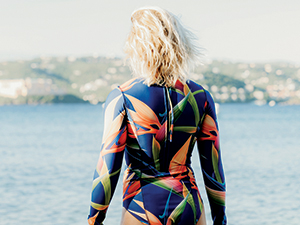
“As a brand rooted in beach life, it’s clear to us that we have to do something to counteract the current pollution levels,” says Billy Little, Le Club vice president of operations and design. “By manufacturing our products using plastic waste, we’re not only offering top quality swimwear to our customers but also doing our part to make a positive change that helps the planet.”
Viva La Pina’s activewear for women is created from recycled materials. Its printed fabrics incorporate recycled plastic bottles and other post-consumer waste. The solid-colored fabrics are made from regenerated nylon from recycled fishing nets, old carpets and other post-consumer waste. The stretchy, comfortable and sun-protective activewear is suitable for just about any water-related activity: snorkeling, yoga, kiteboarding and surfing.
Owner Christine Belmonte says, “We started looking into more sustainable ways to produce our collections and came across all these interesting materials such as nylon fishing nets and plastic water bottles that were being repurposed into activewear and decided to try to make our products out of them.”
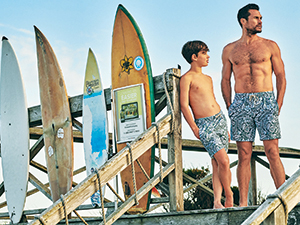
“We decided to start a sustainable brand because we wanted to protect a place we love, Fair Harbor, New York, where we spent childhood summers with our family,” says Caroline Danehy. “Witnessing waste wash up onto Fire Island shores, we knew we had to take action to preserve that joy for future generations.”
The venture has paid off for the dedicated siblings. “Our passion and persistence have evolved Fair Harbor into the fastest growing sustainable beachwear company in the United States,” says Jake Danehy. “We’ve gathered more than 35,000 five-star reviews from passionate customers who appreciate our conscientious approach to comfort.”
Guy Harvey introduced the Threadcycled men’s tee at January 2022 Surf Expo. According to the wildlife artist and conservationist brand’s founder, Dr. Guy Harvey, the tee is “the most environmentally friendly T-shirt we’ve developed thus far.”
“It’s made from a zero-waste process,” he continues. “Our factory takes the leftover scraps that would end up in a landfill and mechanically recycles them into the fibers with recycled polyester to create Threadcycled yarns.”
According to Harvey, the fashion industry contributes to upwards of 148 million tons of fashion waste each year. “We are proud to be on the forefront of positive change in the industry,” he says.
Responsible reclining
Apparel isn’t the only product category taking plastics out of the waste stream. LowTides Ocean Products was formed in 2019 with a simple mission: do good, look good.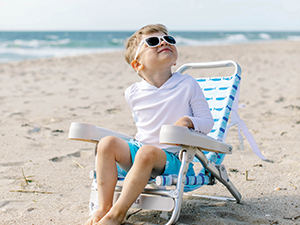
The company’s beach chairs are built with upcycled ocean plastics. Armrests and kickplates are molded with upcycled HDPE pellets from resin sourced from 100% ocean-bound plastic.
LowTides also avoids using virgin plastic for its hang tags.
“Removing plastic from the environment is an evolving mission for LowTides,” says Elizabeth Ackman, co-founder and marketing director. “There is a need in the market for products that have a purpose and of course, look good. Our beach chair reimagined offers the bonus of making a difference in this world simply by sitting back.”
In its new collection available in May 2022, the beach chair fabric will be woven recycled performance fiber brand, Repreve.
Eco-conscious Kitchenware
The beach isn’t the only place where eco-friendly products can be utilized. There are also more practical products for everyday tasks, like in the kitchen. ELC Designs recently introduced a dish cloth to its product lineup. The biodegradable cloth, available in starfish, sea turtle and sea horse designs, replaces 15 rolls of paper towels.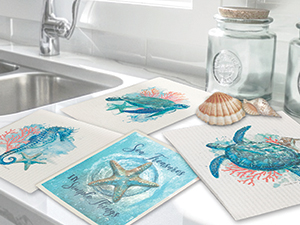
ELC Designs’ Michelle DeBlasio explains, “So you do your dishes, and you wipe your counters, then it goes into the dishwasher or washing machine and it dries back into its original shape. You do it again and again until it gets old. Since it is just wood pulp, it biodegrades.” She adds, “It is great for seaside retailers because it is flat and easily fits into people’s suitcases.”
Coconut Bowls was inspired by the opportunity to reduce single use plastics, source sustainable coconut shells and provide jobs for local artisans and farmers in Bali. The products are compostable at the end of their life. According to Harry Patchett, partnership and wholesale manager, the products encourage people to connect with nature and consider their environmental footprint.
The company uses sustainable packaging, offsets carbon for shipping through a partnership with Cool Effect and donates 1% of every sale to ocean conservation and reforestation projects through 1% for the Planet.
“Coconut Bowls is more than just a brand, we’re a movement for global sustainability,” says Patchett.
Meli Wraps are a green alternative to plastic wrap for food storage. They can cover a dish, a food item or be folded into an envelope for snacks. They are made with GOTS certified organic cotton and Hawaiian Beeswax as well as organic plant oils. They can be used up to 150 times and are biodegradable.
“Meli Wraps are a unique product that is not only great for the planet but also a wonderful gift item,” says Meli Wraps Co-founder and President Melia Foster, who started the product on the island of Kauai.
She adds, “Growing up on a small island, you become very aware of your carbon footprint and our mission is to inspire people to choose reusable plastic-free products such as beeswax wraps.”
Giving a voice to the voiceless
Plush toys are becoming more than a cuddly toy, but also a tool to spread awareness about the ocean plastics crisis. Wild Republic’s Message from The Planet line features colorful pop art graphics with short, impactful messages. Adding the artwork, according to Alex Radojevic, global vice president of creative and branding, allowed Wild Republic to “give a voice to the voiceless.”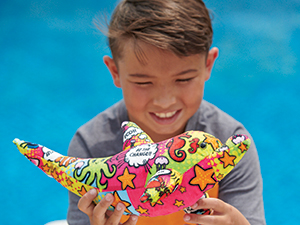
Not only is the outside and filling made with recycled plastic bottles, Radojevic says Message from the Planet plush also features the industry’s first plastic eye made from 100% recycled plastic. Available in seaside favorites like turtles, sharks and dolphins, these plush toys are sure to be a hit with the youngest ocean conservationists.
Trash to treasure
Opolis Optics sunglasses are made from plant-based and natural materials consisting of cotton seeds, red pulp and hemp. The sunglasses are biodegradable, able to turn back into soil within 115 days of being discarded. The metal hinges and core of the frames are made from scrap metal recovered from Kenyan landfills.Founder James Merrill says, “By carrying eco-friendly products like Opolis sunglasses, a retailer has an opportunity to engage with their existing customer base and attract new audiences while helping to improve the environment and the communities most impacted by pollution.”
Mattie Mae Larson, founder of Upcycle Hawaii, considers herself a “trashionista” creating a variety of products, including earrings, beach totes, night lights, keychains, stickers and ornaments from upcycled materials diverted from the waste stream.
Her company uses fibers, ropes and nets recovered from local beach cleanup efforts and melts them down to create colorful melted marine debris products including earrings, nightlights and suncatchers.
Telling a story
Christopher Vasconcelos, owner of Harborside Upcycled found inspiration for his upcycled creations on the beaches of Massachusetts, walking with his two sons.“We could not walk more than a few feet without stepping on fishing net or rope,” he says. “The colors were bright and beautiful.”

“Using recycled rope is a way to connect with almost any coastal town that discards old fishing line and be a resource for recycling,” he says.
Ebb Tide Designs is another home decor business that found its stride making items from reclaimed materials. The dad and daughter business officially started during the pandemic though Kelly Ethevenin and Pete McBrien have been making art together for as long as Ethevenin can remember.
“Our products are hand-sourced and made from materials that we collect along the coast, so each piece has a story to tell,” explains Ethevenin.
During a family wedding in Amagansett, New York, Pete and Kelly saw a crew dismantling an old wooden walkway. The wood was beautifully weathered by the sea and wind. They gathered up as many pieces of the wood that they could fit in their cars and created an array of products inspired by the trip, including a hand-cut and carved fish with all the natural nail holes and dings still in the wood.
“We love the story behind this piece and take comfort that we were able to save a little bit of this walkway, which brought so many magical memories to other families,” Ethevenin says.
Eco-friendly products inspire people, tell a story and contribute to the preservation of the land and sea that your customers hold dear. You can help them feel like they too are contributing to the solution when they purchase a product from your store.



